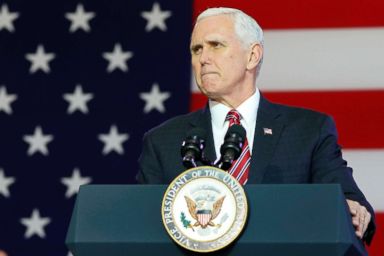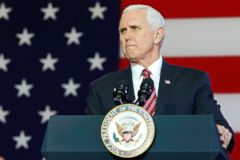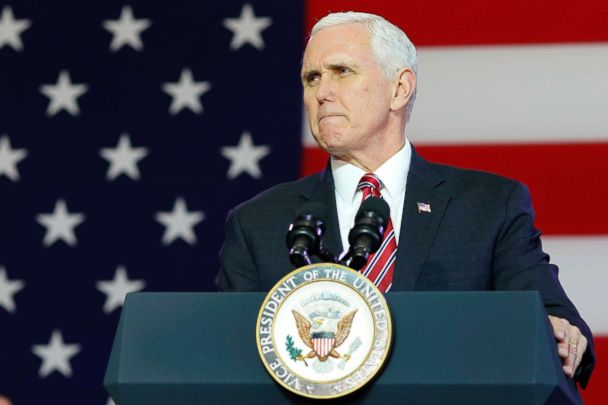






With President Donald Trump skipping what was supposed to be his first trip to South America as president this weekend to instead focus on a potential military response to the suspected chemical attack in Syria, Vice President Mike Pence is stepping onto the world stage in the president’s place.
When Pence arrives in Lima, Peru, on Friday for the Summit of the Americas, the president’s absence will be felt as many in the region already question the United States’ commitment to Latin America under the Trump administration.
“He’s not the president, and so that sends the message that the U.S. under this administration gives Latin America no priority, so that’s a problem,” said Mark Schneider, a senior adviser on the Americas at the Center for Strategic and International Studies.
While the White House concedes that the timing is “unfortunate,” an official said that the vice president is the highest-level alternative and notes that the vice president has already traveled to the region once and is engaged on the issues.
“The president chose to send his No. 2 — the vice president — precisely to show how important the relationships in the Latin American region are to the Trump administration,” a White House official said. “He could have sent a lower-level delegation in his stead but tapped the vice president to go to reassure our allies of the administration’s commitment to the region.”
But when it comes to the business of diplomacy, Schneider said Pence in some ways is a preferred alternative to Trump in that “he’s a better messenger on the specifics.”
“I think that he has a better shot at being seen by the Latins as more accepting and recognizing the efforts that they’re making in handling the Venezuela situation. In that regard, he’s likely to get a better reception,” said Schneider.
It’s an opinion shared by Mark Feierstein, who worked on Western Hemisphere Affairs at the National Security Council under President Barack Obama, who notes that Pence is less likely to insult Latin American leaders through his rhetoric.
“Pence is arguably a better representative for the United States than Trump,” said Feierstein, now a senior adviser to the Albright Stonebridge Group. “He won’t go off message and he will deliver his talking points with respect.”
But even so, Pence is expected to face skepticism from other regional leaders who feel the Trump administration has not prioritized it hemispheric relationships and have been insulted by some of the rhetoric that’s come from the White House.
“One of the biggest challenges for Pence is the sense that the Trump administration has yet to develop a coherent policy toward South America but also just the disdain that Trump seems to have for the region,” Feierstein said. “It’s obviously not helpful when you call Mexicans rapists, talk about building a wall, and as a result, Trump’s approval ratings are very low in the region.”
In addition to the business of the summit, Pence has one-on-one meetings scheduled with the leaders of Peru, Colombia, Argentina, Chile and Canada. While there is no meeting with the president of Mexico on the schedule, a White House official noted that the vice president is largely operating off the schedule that was “prearranged when the president was going to go” on the trip and didn’t rule out the possibility that such a meeting could be added.
One important topic of discussion, White House officials said, will be immigration and border security. While the president is known to use hot rhetoric on the issue and has blamed Mexico for not doing more to stop the flow of migrants to the U.S., the vice president is expected to speak of the issue as a matter of shared interest in his meeting with leaders.
“It’s … something that we’ll emphasize in those meetings, that our immigration security, which is a key priority for the administration, is helped by our strong security relationships with our partners in the region. They help us maintain migration flows. We want to help make sure that we take those security partnerships and build them because they’re in our interests,” a White House official said.
Schneider said that the president’s harsh rhetoric about migrants coming the United States from Central America has been damaging and the language he has used in sending National Guard troops to the U.S.’s border with Mexico has been met with a “very cold and negative reception” in the region.
“When the U.S. slams Mexico for letting everybody through, Latins know that that’s not true No. 1, and Latin American countries also know that Mexico has limited capacity and is doing a relatively decent job,” Schneider said. “[And] the idea of sending U.S. troops to the border, even though sending National Guard troops to the border has been done before, the way that President Trump phrases is seen as a slap in the face by Latins.”
With Pence not expected to dust up controversy on the hot-button issue of immigration as Trump might have, another focus of his on the trip will be to make the case to Latin American countries that the United States is a preferred trading partner over China, which is also vying for trade partnerships in the region.
“We think that the United States is and should remain the partner of choice for our partners across Latin America, and we’ll highlight themes like pursuing a fair and reciprocal treatment in our trade relationships,” a White House official said.
But Feierstein said that may be a tough sell given that the Trump administration’s actions on trade and engagement.
“They want to underscore that we’re a better economic partner than China, but it’s a tough message to deliver when you pull out of TPP [Trans-Pacific Partnership], and talking about withdrawing from NAFTA [North American Free Trade Agreement], talk about building a wall, and cutting foreign assistance, that’s not a message of engagement,” Feierstein said.
When it comes to what is the United States most pressing trade issue in the hemisphere — the trilateral relationship between the United States Canada, and Mexico and the renegotiation of NAFTA — no announcements are expected.
“We don’t anticipate substantive discussions on NAFTA at the summit,” a senior administration official told reporters last week.
Trump has repeatedly threatened to pull the U.S. out altogether if it cannot be reworked to his satisfaction. Negotiations between the three countries remain ongoing.
U.S. Trade Representative Robert Lighthizer, who has been leading the negotiations for the U.S., is no longer attending the summit. But the president’s son-in-law and senior adviser Jared Kushner, who has also been involved in NAFTA negotiations, will be traveling to Peru along with the vice president. The White House has not provided specific details about Kushner’s agenda while in Peru.
Also looming large over the meeting of leaders is the political and humanitarian crisis in Venezuela. While Venezuela’s President Nicolas Maduro was uninvited from the summit, Schneider believes leaders need to issue a unified message.
“The slide into dictatorship in Venezuela is not stopping, and it’s most pressing challenge for the hemisphere, so I think if there’s not something out of the summit that’s seen as the hemisphere taking significant action, the summit will not be a success.”
But a senior administration official said no new announcements related to Venezuela are expected out of the summit.
“We don’t anticipate any new announcements at the Summit of the Americas,” a senior official said. “We anticipate over the next several months, that we’ll see more U.S. steps to punish both Maduro and the cronies that he keeps in power through his corruption.”
But even as no unified actions are expected to be announced, a White House official said the fact that Maduro was uninvited to the summit sends a strong message.
“Venezuela was disinvited by the Latin American host. That is unprecedented,” the official said. “It’s going to demonstrate that the region itself — not because the United States has coerced or convinced or pleaded, but because the people from these countries can see what that looks like as an alternative.”

